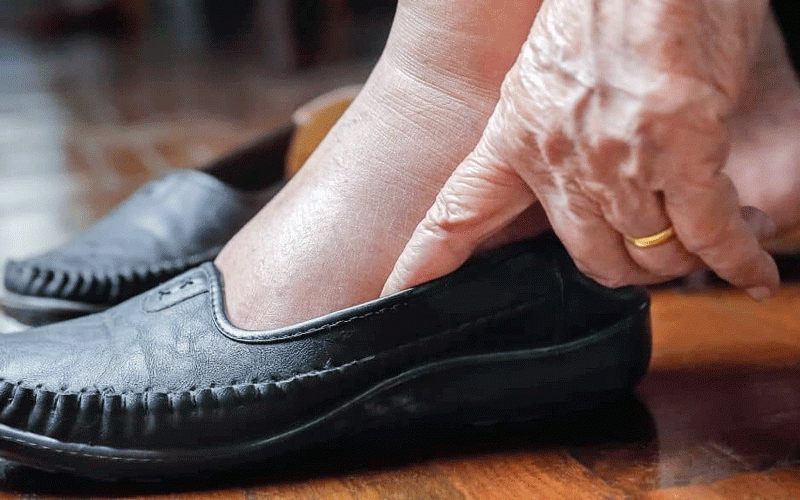
So many people have reported to us with unexplained swelling of their bodies. In some cases, oedema has often been caused by organ damage or failure in the form of kidneys, liver or heart. It is, thus, imperative not to ignore oedema as that can be a sign of a more virulent disease in some patients. Although oedema can affect any part of the body, you may notice it more in your legs, ankles, feet, arms and hands.
Oedema occurs when tiny blood vessels in the body (capillaries) leak fluid. The fluid builds up in surrounding tissues causing swelling. Normally, the body maintains a careful balance of fluid movement between complex networks of blood vessels, the lymphatic system and all of the tissues surrounding them.
However, if this system is thrown off balance, the capillaries may leak fluid that builds up in surrounding tissues resulting in oedema. Oedema most commonly occurs in the legs due to gravity. In addition to swelling, other signs and symptoms associated with oedema may include:
- Stretched or shiny skin, especially after the legs have been below the level of the heart for a prolonged time, such as when walking, standing or sitting.
- Skin that stays indented for at least five seconds after being pressed
Causes
While some swelling appears without underlying pathologies, others can come because of other diseases, which may be very fatal. Mild causes of oedema include:
- Sitting or staying in one position for too long
- Premenstrual symptoms and signs
- Pregnancy
- BP medication like Amlodipine
- Steroid drugs
- Oestrogens
- Non-steroidal anti-inflammatory drugs like Diclofenac
Moreover, oedema can be a sign of a more serious disease. The following should be ruled out if you have oedema.
- Congestive heart disease
- Kidney disease
- Kidney damage
- Liver disease
In this condition one or both of the heart’s lower chambers lose their ability to pump blood effectively. As a result, blood can back up in the legs, ankles and feet, causing oedema. Congestive heart failure may cause fluid to accumulate in your abdomen or in the lungs (pulmonary oedema), which causes shortness of breath.
Kidney disease: In kidney disease, extra fluid and sodium in the blood circulation may cause oedema. The oedema associated with kidney disease usually occurs in the legs and around the eyes. Make sure your kidneys are well. Do urea and electrolytes plus creatinine tests.
- Health talk: Be wary of measles, its a deadly disease
- Health talk: Mandatory wearing of masks can now be scrapped
- Health talk: Antimicrobial resistance —Let us stand against it
- Health talk: Health sector bears brunt of power cuts
Keep Reading
Kidney damage: Damage to the tiny, filtering blood vessels in the kidneys can result in nephrotic syndrome. In nephrotic syndrome, declining levels of protein (albumin) in the blood can lead to fluid accumulation and oedema.
Liver cirrhosis: Fluid may accumulate in your abdominal cavity (ascites) and in your legs as a result of liver damage (cirrhosis). Common condition in those who take excessive alcohol!
Weakness or damage to veins in your legs: If you have chronic venous insufficiency, the one-way valves in your leg veins are weakened or damaged, which allows blood to pool in your leg veins and causes swelling. Sudden onset of swelling in one leg accompanied by pain in your calf muscle can be due to a blood clot (deep vein thrombosis, or DVT) in one of your leg veins. If this occurs, seek medical help immediately.
Inadequate lymphatic system: The body’s lymphatic system helps clear excess fluid from tissues. If this system is damaged — for example, by cancer surgery — the lymph nodes and lymph vessels draining an area may not work correctly, and oedema can occur.
Severe, long-term protein deficiency: An extreme lack (deficiency), of protein in your diet over a long period of time can lead to fluid accumulation and oedema. Protein loss in conditions like Nephrotic syndrome can result in gross swelling. Please check for proteins in the urine.
See your doctor or your clinician immediately if you experience:
- Shortness of breath
- Difficulty breathing
- Chest pain
These can be signs of pulmonary oedema, which requires prompt treatment.
If you have been sitting for a prolonged period, such as on a long flight, and you develop leg pain and swelling that won’t go away, call your doctor.
Persistent leg pain and swelling can indicate a blood clot deep in your vein (deep vein thrombosis, or DVT)
Investigations
Some of the tests include the following:
- Kidney function tests, liver function tests
- Full blood count, check for anaemia.
- Urinalysis
- Urine analysis to check protein in urine which occurs in kidney damage
- Chest X-rays
- Ultrasound scans
- Echocardiography
- treatment
- Mild oedema usually goes away on its own, particularly if you help things along by raising the affected limb higher than your heart.
- More-severe oedema may be treated with drugs that help your body expel excess fluid in the form of urine (diuretics) like Furosemide with potassium-retaining drugs or supplements.
- Long-term management typically focuses on treating the underlying cause of the swelling. Treat kidney failure, heart failure, liver failure if investigated to be there.
Advise your friend to seek treatment with oedema. Do not delay please!
- Dr Johannes Marisa is a medical practitioner and educationist who can be accessed on doctormarisa@gmail.com









